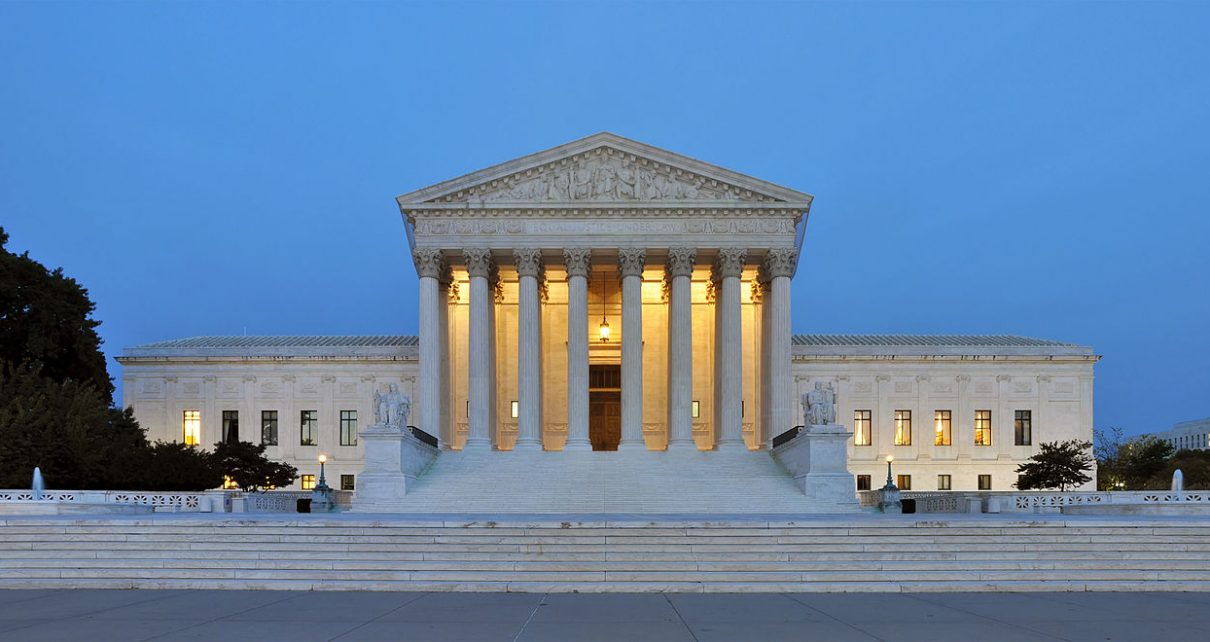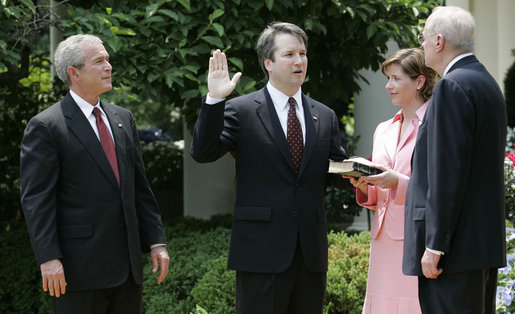
Supreme Court of the United States. (Photo: U.S. Supreme Court)
OPINION: The Courts Are No Place to Establish Policy
The abortion debate must be left to Congress and State Legislatures
By Martin Marks, May 5, 2022 2:35 am
Let’s get this out of the way from the start. While I have a clear position on abortion, this essay will attempt to keep those views suppressed.
With the recently leaked draft Supreme Court decision that will apparently overturn the 1973 Roe v. Wade landmark decision making abortion legal in the United States, the fire of perhaps the most divisive issue of our times has been re-ignited. Activists from both sides of the issue—some incensed, some relieved— have taken to the streets, placards and megaphones in hand, to demonstrate in front of the U.S. Supreme Court and on the steps of other more proximately located courthouses across the land.
And while passions and tempers are understandably at their peaks, here is yet another example of a misunderstanding of basic U.S. Civics and a clear indication that the subject is inadequately addressed in our schools. The Judicial Branch of the U.S. Government is not the venue to create policy to support your pet issue or world view. It is not the place to champion the will of the people. Policy creation necessarily and constitutionally rests with the legislative and executive branches of government. It is then up to the courts to determine if that policy passes constitutional scrutiny.
And this misunderstanding of government not only lies with the aforementioned placard waivers marching in front of our courts and with the rank and file keyboard warriors voicing opinions on social media, but also with the professional political pundits now opining on the draft SCOTUS opinion on television, radio, editorial pages and elsewhere. In fact, it is my contention that many judges now occupying benches at various levels of our judiciary also fail to understand their role and limitations. Far too often the men and women donning the black robes approach their tasks in reverse—first identifying their desired outcome and then diving into case law or the Constitution to extract a justification for that desired outcome. And invariably this is where policy is created—not by a deliberative body elected by the people, but rather by a handful of appointees essentially answerable to no one.
And nothing else can better typify this judicial overreach that resulted in the creation of policy than the 1973 U.S. Supreme Court decision Roe v. Wade.
It was Justice Harry Blackmun who authored the majority’s Roe V. Wade decision in 1973. The written opinion was long and Blackmun referenced all sorts of historical perspective on how different cultures approached abortion. However, Blackmun never cited a provision in the U.S. Constitution that granted the right to terminate a pregnancy—most probably because there is none. This is where the SCOTUS decision runs afoul of scholars and jurists from both Liberal and Conservative groundings.
Justice Samuel Alito, in the draft opinion leaked to the press writes,
“The constitution makes no reference to abortion and no such right is implicitly protected by any constitutional provision.”
He continued,
“Roe was egregiously wrong from its start. Its reasoning was exceptionally weak, and its decision
has had damaging consequences……” “It is time to heed the Constitution and return the issue of abortion to the people’s elected representatives.”
The late Justice Ruth Bader Ginsburg, iconic hero to Liberal causes and women in particular, also had issue with the Roe v. Wade decision, seeing it as overreaching and unnecessarily usurping the ongoing political process at the time which was leading to liberalizing abortion laws. She said,
The Supreme Court could have held that the most restrictive (Texas) law was unconstitutional
and put down its pen. Instead, the Court wrote an opinion that made every abortion restriction
in the country illegal in one fell swoop. And this is not the way the court ordinarily operates.
In other words, Justice Ginsburg felt that the Court had created its own policy rather than simply ruling on the case before it. And she was right.
So, the overturning of the 50-year-old decision Roe v Wade appears to be imminent. Will this make abortion illegal as some are fearing? Of course not. Rather, it will return the abortion debate and policy decisions back to the individual states where it belongs. It is safe to say that abortion in the state of California where more abortions are performed than any other state, will continue to permit the procedure. In fact, it is likely that the Golden State will become a haven for the procedure and will help facilitate getting women here from states where more restrictive laws are ultimately put into place.
Some perceive the forthcoming overrule of Roe v. Wade as a step backward. Debatable, depending upon your perspective. What is not debatable though is that the overrule is indeed a step forward constitutionally as it sets right a poorly reasoned judicial overreach now five decades old.
It’s hard to be indifferent about the abortion debate. And if one feels passionately one way or the other, understand that the place to voice an opinion or just plain vent is not on the steps of The U.S. Supreme Court. Moving forward, the appropriate place to get your stance heard and acted upon will be with your governor and state legislators. Encourage them to enact policy that fits your view, and if they don’t, vote for someone else.
Perhaps the best way to decisively deal with the issue so this or any future U.S. Supreme Court never again has the power to enact abortion policy by interpreting the Constitution, is to amend the Constitution so a right—reproductive or unborn child’s is clearly spelled out. Difficult as the process might be to do so, it has been successfully accomplished 27 times to date.
- Dodgers’ Ohtani Embroiled in Gambling Scandal - March 22, 2024
- Overwhelming Migrant Ingress Shifts To California - March 5, 2024
- Bay Area School District Parting Ways With Woke Kindergarten Program - February 15, 2024





True the Courts were never meant to be the place to create policy and that protesters (insurrectionists?) are screaming at the wrong buildings and home residences of our judges. But what Mr. Marks misses is the fact that this breach of security at our most “Supreme” Court means that politics have officially infiltrated our court systems in a most illegal and sinister way. In fact, Democrat politicians seem to be celebrating this security breach, if they didn’t encourage it and/or arrange to pay for it. This breach, which is really a criminal act 100 times the severity of the Watergate break-in, should be in focus and fully investigated rather than the contents of a working draft opinion document. But with the media controlling the narrative, their focus has been the divisive abortion argument – once again. Why? Again this is something Mr. Marks misses. The Democrats are desperate, not just because their policies are failing, but because they are starting to see their power and influence slowly slipping away as poll after poll indicates a “revolution” in the November elections. Their failures are well chronicled whether it’s homeland security at our borders, war debacles in Afghanistan and Ukraine, record crime in mostly Democrat controlled cities, roaring inflation hurting mostly lower and middle income Americans – and of course a highly dysfunctional and incompetent White House. So, let’s call this “security breach” at the Supreme Court what it really is and that’s a crime with the obvious motives being politically driven to stir up the Democrat base and take attention away from their latest policy failures.